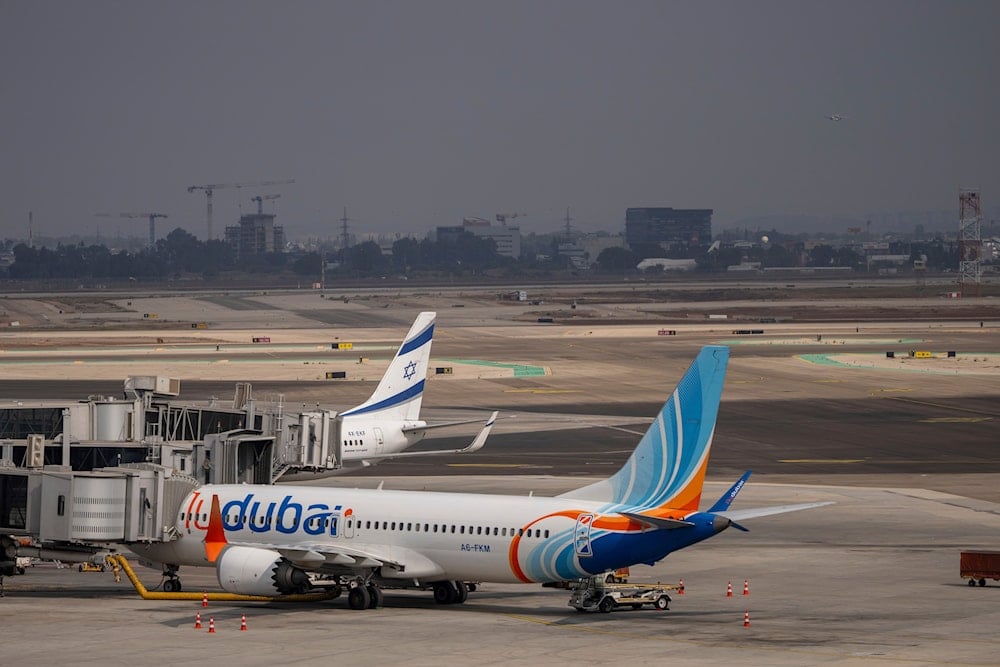'Israel' further isolated amid flights drop-off to, from entity
Retaliatory strikes against the occupation have heightened fears among international airlines, leading to the suspension of flights, thus further isolating the occupation.
-

A Fly Dubai plane is parked on the tarmac at Ben Gurion International Airport near Lydd, occupied Palestine, on November 10, 2024. (AP)
The ongoing Israeli war against the Gaza Strip has further isolated the occupation amid a massive drop-off in flights to and from the occupied land.
Direct flights to major cities like Washington DC, San Francisco, Toronto, Hong Kong, and New Delhi have been suspended, leaving, out of the 20 airlines that were active before the war, only Israeli companies operating.
According to the airport authority, the suspension of flights marked a drop in the number of planes and passengers into Ben Gurion Airport by 40% in the first nine months of 2024.
The largest drop was recorded by North American airlines - Delta Air Lines Inc., United Airlines Holdings Inc., American Airlines Group Inc., and Air Canada.
Amid the ongoing war and continued security threats from both Gaza and Lebanon's Resistance, "Israel’s" high-tech leaders, grappling with a decline in investors and business activity, are looking for solutions. One such initiative, set to launch in January, is called Airtech. It aims to offer charter flights three times a week between "Israel" and the United States.
European airlines suspend flights
The flight disruptions began immediately following the launch of Operation Al-Aqsa Flood against the Israeli occupation on October 7, which was joined by Hezbollah to the north, leading to the launch of thousands of rockets.
Foreign airlines initially suspended operations, briefly resumed flights, and then halted them again. Many airlines are now delaying their return for weeks, months, or, in some cases, indefinitely.
Israeli airfare chaos jolts inflation
The ongoing operations against the occupation have significantly set back Israeli aviation, erasing over a decade of progress made since the "open skies reform" of 2013, which, according to Bloomberg, opened the door for numerous airlines to operate in "Israel".
On an international level, "Israel" has also been isolated as relations with some nations have reversed, such as relations with Turkey, which is now boycotting the occupation. By blocking Israeli flights from the Turkish transit hub, "Israel" has lost direct flight access to countries such as Jordan, Egypt, Morocco, Bahrain, and many cities across Greece, Italy, and Eastern Europe.
“Flight prices are up 50 to 200% and in some cases, 300 to 400%,” says Hanny Sobol, the CEO of Diesenhaus Group, a travel agency, adding that seats are scarce.
Shipping costs have been affected as well. Amir Shani, the owner of the Israeli air forwarding company Amit and president of the Air Forwarders' Association, attributes this to a growing dependence on passenger planes for cargo shipments. Prior to the war, over 50% of "Israel's" cargo was transported via passenger aircraft.
“Aerial shipping costs have surged by some 250%,” Shani said, which made slaying inflation much harder.
Supply shortages have caused delivery times to triple, according to the CEO of a dental implants factory in northern occupied Palestine, who wished to remain anonymous. He explained that this delay has led to a decline in sales and disrupted the company's cash flow.
One of the main concerns is that some airlines may not come back. The group has told Parliament, “If there is no advance planning for the summer season, aircrafts will be assigned to other destinations. Therefore, to avoid at least another year of collapse of the Israeli aviation industry, bold and swift action must be taken.”
Read next: Why 'Israel's' ultimate defeat will come from economic isolation

 4 Min Read
4 Min Read








